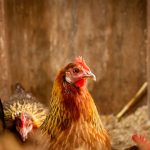In order to effectively address the issue of egg-eating in chickens, it is crucial to understand the root of the problem. Egg-eating behavior in chickens can stem from a variety of factors, including boredom, overcrowding, poor nutrition, or even a lack of proper nesting boxes. Chickens may also develop the habit of egg-eating if they accidentally break an egg and discover that it is a source of food.
Additionally, some chickens may resort to eating their own eggs if they are not receiving enough calcium in their diet, which can lead to weak eggshells that are more prone to breaking. By understanding the underlying causes of egg-eating behavior, chicken owners can take proactive steps to address these issues and prevent further egg consumption. Another potential cause of egg-eating behavior in chickens is stress or anxiety.
Chickens that are exposed to stressful environments, such as loud noises, predator threats, or aggressive flock mates, may resort to egg-eating as a coping mechanism. It is important for chicken owners to carefully observe their flock and identify any potential sources of stress that may be contributing to egg-eating behavior. By addressing these underlying stressors and creating a more comfortable and safe environment for the chickens, it is possible to reduce the incidence of egg-eating and promote healthier behaviors in the flock.
Table of Contents
- 1 Creating a Comfortable and Safe Environment
- 2 Providing Proper Nutrition
- 3 Regular Egg Collection
- 4 Implementing Egg-Gathering Devices
- 5 Addressing Behavioral Issues
- 6 Seeking Professional Advice
- 7 FAQs
- 7.1 What are some common reasons why chickens eat their own eggs?
- 7.2 How can I prevent chickens from eating their eggs?
- 7.3 Are there any specific dietary changes I can make to stop chickens from eating their eggs?
- 7.4 What are some signs that my chickens may be eating their eggs?
- 7.5 Can I train my chickens to stop eating their eggs?
Key Takeaways
- Understanding the root of the problem is crucial for effectively addressing issues with egg-laying hens.
- Creating a comfortable and safe environment is essential for ensuring the well-being of the hens and encouraging regular egg production.
- Providing proper nutrition, including a balanced diet and access to fresh water, is key to supporting healthy egg-laying.
- Regular egg collection helps prevent hens from becoming broody and encourages continued egg production.
- Implementing egg-gathering devices can make the collection process more efficient and less stressful for both the hens and the caretakers.
- Addressing behavioral issues, such as aggression or feather pecking, is important for maintaining a harmonious flock and maximizing egg production.
- Seeking professional advice from a veterinarian or experienced poultry keeper can provide valuable insights and solutions for optimizing egg-laying hen management.
Creating a Comfortable and Safe Environment
Providing Proper Nesting Boxes
Proper nesting boxes are essential for encouraging hens to lay their eggs in a safe and secure environment. The nesting boxes should be secluded and lined with soft bedding to make the hens feel comfortable and secure.
In addition to physical comfort, it is also important to consider the social dynamics within the flock. Chickens thrive in environments where they feel safe and secure among their flock mates. By minimizing aggression and providing opportunities for social interaction, chicken owners can help reduce stress and anxiety within the flock.
Reducing Stress and Anxiety
By creating a harmonious social environment within the flock, chicken owners can help promote healthier behaviors and reduce the incidence of egg-eating. A stress-free and comfortable living space can help reduce the likelihood of egg-eating behavior and promote overall well-being in the flock.
Providing Proper Nutrition
Proper nutrition is essential for preventing egg-eating behavior in chickens. A well-balanced diet that includes sufficient levels of protein, calcium, and other essential nutrients is crucial for promoting healthy egg production and strong eggshells. Inadequate nutrition can lead to weak eggshells that are more prone to breaking, which can increase the likelihood of egg-eating behavior in chickens.
By providing a high-quality layer feed that is specifically formulated to meet the nutritional needs of laying hens, chicken owners can help ensure that their flock receives the essential nutrients necessary for healthy egg production. In addition to a balanced diet, it is important to provide access to fresh water at all times. Dehydration can lead to decreased egg production and weaker eggshells, which can contribute to egg-eating behavior in chickens.
By ensuring that the flock has access to clean and fresh water throughout the day, chicken owners can help promote healthy hydration and reduce the risk of egg-eating behavior. Proper nutrition and hydration are essential for supporting healthy egg production and preventing egg-eating behavior in chickens.
Regular Egg Collection
Regular egg collection is an important practice for preventing egg-eating behavior in chickens. Allowing eggs to accumulate in the nesting boxes can increase the likelihood of breakage, which can lead to egg-eating behavior as chickens discover the contents of broken eggs. By collecting eggs on a regular basis, chicken owners can minimize the risk of breakage and reduce the opportunity for chickens to develop the habit of egg-eating.
Implementing a routine for collecting eggs throughout the day can help promote healthier behaviors in the flock and prevent the occurrence of egg-eating behavior. In addition to regular collection, it is important to carefully inspect each egg for signs of damage or weakness. Eggs with cracks or thin shells should be removed from the nesting boxes to prevent breakage and discourage egg-eating behavior in chickens.
By promptly removing damaged eggs from the coop, chicken owners can help maintain a clean and safe environment for their flock and reduce the risk of egg consumption. Regular egg collection and inspection are essential practices for preventing egg-eating behavior and promoting healthy egg production in chickens.
Implementing Egg-Gathering Devices
Implementing egg-gathering devices can help prevent egg-eating behavior in chickens by providing a secure location for eggs to be laid and collected. Nesting boxes with rollaway or sloped floors can help prevent hens from accessing their own eggs after they have been laid, reducing the opportunity for them to develop the habit of egg-eating. Additionally, installing fake eggs or golf balls in the nesting boxes can help discourage hens from pecking at their own eggs, as they will be less likely to recognize them as a potential food source.
By implementing these devices, chicken owners can help promote healthier behaviors in their flock and reduce the incidence of egg-eating behavior. Another effective method for preventing egg-eating behavior is to provide separate areas for hens to lay their eggs away from the main flock. This can be achieved by creating individual nesting areas or using dividers within the nesting boxes to create secluded spaces for each hen.
By providing private areas for laying eggs, chicken owners can help reduce competition and stress within the flock, which can in turn decrease the likelihood of egg-eating behavior. Implementing these strategies can help create a more secure environment for egg-laying and promote healthier behaviors in chickens.
Addressing Behavioral Issues

Aggressive or dominant hens may peck at eggs laid by other flock members, leading to breakage and potential consumption of the contents. By carefully observing the social dynamics within the flock and addressing any instances of aggression or bullying, chicken owners can help reduce stress and competition among the hens, which can in turn decrease the likelihood of egg-eating behavior.
Promoting Healthier Behaviors
Providing opportunities for social interaction and minimizing aggressive behaviors within the flock can help promote healthier behaviors and reduce the risk of egg consumption. Additionally, it is important to provide enrichment activities to prevent boredom and encourage natural behaviors in chickens. Boredom can lead to destructive behaviors, such as pecking at eggs, as hens seek stimulation and entertainment.
Preventing Boredom and Encouraging Natural Behaviors
By providing opportunities for foraging, dust bathing, and other natural activities, chicken owners can help keep their flock engaged and satisfied, reducing the likelihood of egg-eating behavior. Addressing behavioral issues within the flock is crucial for promoting healthier behaviors and preventing egg consumption in chickens.
Seeking Professional Advice
In some cases, addressing egg-eating behavior in chickens may require professional advice from a veterinarian or experienced poultry specialist. If despite implementing various strategies, egg-eating behavior persists within the flock, it may be necessary to seek professional guidance to identify any underlying health issues or behavioral concerns that may be contributing to this problem. A veterinarian or poultry specialist can provide valuable insights and recommendations for addressing egg-eating behavior based on their expertise and experience working with chickens.
Professional advice may also be necessary if there are concerns about the overall health and well-being of the flock. A veterinarian can conduct a thorough health assessment of the chickens to identify any potential health issues that may be contributing to egg-eating behavior. Additionally, they can provide guidance on proper nutrition, environmental management, and behavioral enrichment strategies to promote healthier behaviors within the flock.
Seeking professional advice is an important step in addressing persistent egg-eating behavior and promoting overall well-being in chickens. In conclusion, addressing egg-eating behavior in chickens requires a comprehensive approach that addresses both environmental and behavioral factors. By understanding the root causes of this problem and implementing strategies to create a comfortable and safe environment, provide proper nutrition, regular egg collection, implementing egg-gathering devices, addressing behavioral issues, and seeking professional advice when necessary, chicken owners can effectively prevent egg-eating behavior and promote healthier behaviors within their flock.
With careful observation, proactive management, and a commitment to promoting well-being in their chickens, owners can create a harmonious environment that supports healthy egg production and prevents destructive behaviors such as egg-eating.
If you’re struggling with keeping chickens from eating their own eggs, you may want to consider implementing some changes to their environment. One helpful article on this topic is “The Chicken Coop Country Diner” from Poultry Wizard. This article discusses the importance of providing a proper feeding area for your chickens to prevent them from developing bad habits, such as egg-eating. By creating a designated dining space for your flock, you can help reduce the likelihood of egg consumption. Check out the full article here.
FAQs
What are some common reasons why chickens eat their own eggs?
Chickens may eat their own eggs due to nutritional deficiencies, boredom, overcrowding, or the instinct to clean up broken eggs.
How can I prevent chickens from eating their eggs?
To prevent chickens from eating their eggs, you can provide a balanced diet, ensure they have enough space and entertainment, collect eggs frequently, and use fake eggs or golf balls to discourage pecking.
Are there any specific dietary changes I can make to stop chickens from eating their eggs?
Adding more calcium to the chickens’ diet, such as through oyster shells or crushed eggshells, can help prevent them from eating their eggs.
What are some signs that my chickens may be eating their eggs?
Signs that chickens may be eating their eggs include finding broken shells in the nesting boxes, egg yolk on the chickens’ beaks, or a decrease in the number of eggs being laid.
Can I train my chickens to stop eating their eggs?
Yes, you can train chickens to stop eating their eggs by promptly removing any broken eggs, providing distractions such as pecking blocks or hanging vegetables, and using positive reinforcement when they leave the eggs alone.
Meet Walter, the feathered-friend fanatic of Florida! Nestled in the sunshine state, Walter struts through life with his feathered companions, clucking his way to happiness. With a coop that’s fancier than a five-star hotel, he’s the Don Juan of the chicken world. When he’s not teaching his hens to do the cha-cha, you’ll find him in a heated debate with his prized rooster, Sir Clucks-a-Lot. Walter’s poultry passion is no yolk; he’s the sunny-side-up guy you never knew you needed in your flock of friends!







